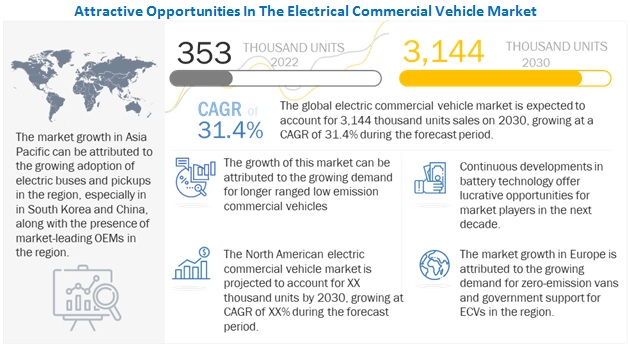The global electric commercial vehicle market size is projected to grow from 353 thousand units in 2022 to 3,144 thousand units by 2030, at a CAGR of 31.4%.
The electric commercial vehicle market will be growing due to factors like the growing demand for zero emissions commuting, government subsidies & tax rebates and plans of automakers for adopting to electrification of their vehicles.
Concerns about the changing environment due to excessive pollution by the automotive industry is one of the prime reasons for government bodies to promote zero emission vehicles over Petrol or Diesel ones. OEMs have started developing plans to welcome an all electric future for their upcoming vehicle lineups. This includes development of electric buses, vans, pickups and trucks. To attract and encourage people to buy ECV’s, governments around the world are introducing lucrative schemes and incentives that include discounts, lower vehicle acquisition taxes, easier applicability of loans etc. for electric commercial vehicles.
Asia Pacific is expected to be the largest market in the forecast
In this report, the Asia Pacific region is segmented into China, India, Japan, and South Korea. The electric commercial vehicle market in the Asia Pacific region is driven by the need to reduce urban pollution and the dependence on fossil fuels. This is also the largest ECV market around the world. China is the largest contributor to the global electric commercial vehicle market, accounting for a share of more than 95% of the electric bus segment. Chinese companies such as BYD, Yutong, Ankai, and Zhongtong dominate the Chinese and global electric commercial vehicle market. Chinese players, who have access to cheaper parts and components, are providing electric buses at lower prices. The Chinese government has made significant investments to convert conventional public transport fleets into electric ones. For instance, it offers a subsidy of around USD 14,000 for electric buses in shenzhen. Similarly, super capacitors, lithium titanate fast charging for electric buses will further get a subsidiary of around USD 21,000.
Download PDF Brochure @ https://www.marketsandmarkets.com/pdfdownloadNew.asp?id=16430819
To increase the adoption of electric vehicles, the Government of India has announced plans for financial support for EVs—a zero-rated goods and services tax (GST) for a window of three years—and the Faster Adoption and Manufacturing of Hybrid and Electric Vehicles (FAME) scheme run by the Department of Heavy Industries. State authorities are rolling out contracts for electrifying the public transport fleet. For instance, in 2018, BYD supplied 25 electric buses to the city of Pune and is expected to supply more in other cities. According to phase 2 of the FAME scheme in January 2022, the Government of India will be giving out 670 electric buses to the states of Maharashtra, Goa, Gujarat, and Chandigarh. In addition to this, 241 charging stations will be provided on the streets of Madhya Pradesh, Tamil Nadu, Kerala, Gujarat, and Port Blair. South Korea and Japan started adopting electric commercial vehicles in the last few years, with the introduction of fuel cell and hybrid vehicles. With advancements in battery technology and focused research, the presence of electric commercial vehicles in these countries has grown considerably. According to a report by Nikki Asia in February 2021, BYD, another Chinese electric carmaker, aims to offer electric buses at a 40% discount to their current price of USD 354,120 (40 million yen) in Japan. Since 2020, the market for electric pickups has grown drastically in South Korea, with over 14,000 domestically built electric pickups sold in 2020.
North America is expected to be the fastest-growing market during the forecast
The North American automotive industry is one of the most advanced in the world. North America is a key region for innovations, cutting-edge R&D, and technological advancements in electric commercial vehicles. The US, which has traditionally been a global technological leader, is the largest electric commercial vehicle market in North America, followed by Canada. Top EV battery providers and startups have partnered with OEMs in the North American EV market. GM has partnered with LG Chem for their EV batteries. Stellantis has partnered with Samsung SDI for EV batteries. Ford is working with SK Innovation for the North American EV market. Tesla manufacturers its EV batteries in-house. All these companies are working together to develop manufacturing hubs in the US. The US has been a pioneer in the development of electric passenger cars, and OEMs are now looking to offer electric commercial vehicles. Robust infrastructure, improved power grids, government encouragement and support, and higher adoption rates have enabled OEMs to develop a range of electric commercial vehicles. Government incentives, the presence of individual investors, and a technological edge are driving the electric commercial vehicle market in North America. Canada is also moving toward the use of electric commercial vehicles. The country has introduced electric buses and plans to focus on other electric commercial vehicles through government incentives and public-private partnership (PPP) schemes. North America is home to several OEMs, such as Proterra, NFI Group, and Blue Bird Corporation, which provide electric commercial vehicles, especially advanced electric buses. For instance, Rivian plans to roll out multiple models of its upcoming R2T electric pick-up truck with an average range of 300-400 miles. The electric commercial vehicle market in North America is expected to grow significantly with the increasing focus of OEMs focus on launching electric pick-up trucks, vans, and buses. The rising demand for zero-emission freight and public transport fleets is also expected to boost the North American electric commercial vehicle market.
Key Market Players:
The electric commercial vehicle market is dominated by established players such as BYD (China), Yutong (China), AB Volvo (Sweden), VDL Groep (Netherland), and CAF (Spain).
Request Free Sample Report @ https://www.marketsandmarkets.com/requestsampleNew.asp?id=16430819
Media Contact
Company Name: MarketsandMarkets™ Research Private Ltd.
Contact Person: Mr. Aashish Mehra
Email: Send Email
Phone: 18886006441
Address:630 Dundee Road Suite 430
City: Northbrook
State: IL 60062
Country: United States
Website: https://www.marketsandmarkets.com/Market-Reports/electric-commercial-vehicle-market-16430819.html

